Click on images to enlarge

infestation (Photo: Rob and Fiona Richardson)
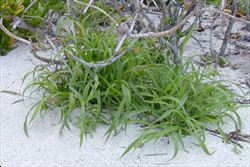
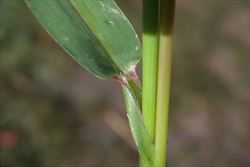
close-up of stem and base of leaf blade (Photo: Rob and Fiona Richardson)

close-up of underside of leaf blade (Photo: Trevor James)
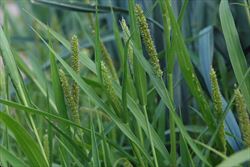
seed-heads (Photo: Rob and Fiona Richardson)
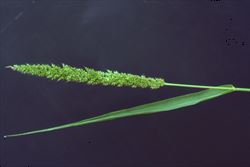
young seed-head (Photo: Trevor James)

seed-head (Photo: Rob and Fiona Richardson)
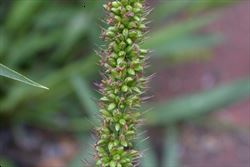
flower spikelets (Photo: Rob and Fiona Richardson)
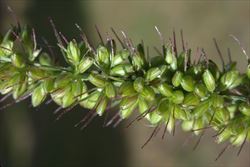
close-up of flower spikelets (Photo: Rob and Fiona Richardson)
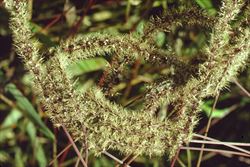
mature seed-heads (Photo: Trevor James)
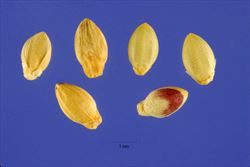
close-up of seeds (Photo: Steve Hurst at USDA PLANTS Database)
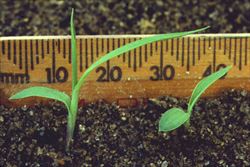
seedlings (Photo: Trevor James)
Scientific Name
Setaria verticillata (L.) P. Beauv.
Synonyms
Panicum verticillatum L.
Family
Gramineae (South Australia)Poaceae (Queensland, New South Wales, the ACT, Victoria, Tasmania, Western Australia and the Northern Territory)
Common Names
bristle pigeon grass, bristly foxtail, bur bristle grass, bur grass, burr bristle grass, foxtail, hooked bristlegrass, lovegrass, pigeon grass, rough bristle grass, sticky grass, whorled pigeon grass, whorled pigeon-grass, whorled pigeongrass
Origin
The origin of this species is unclear, although it is thought to be native to the tropical and sub-tropical regions of Asia and Africa.
Naturalised Distribution
A very widely distributed species that has a scattered presence throughout most of the country and is found in all states and territories. It is most common in New South Wales, the ACT and Victoria and is also relatively common and widespread in Western Australia and South Australia. Less common in Tasmania, Queensland and the southern and central parts of the Northern Territory. Also naturalised on Lord Howe Island and Norfolk Island.
Widely naturalised overseas in North America (i.e. Canada, the USA and Mexico), South America, New Zealand and on several Pacific islands (e.g. Hawaii, the Marshall Islands, the Pitcairn Islands, Guam, Fiji and the Phoenix Islands).
Notes
Whorled pigeon grass (Setaria verticillata) is regarded as an environmental weed in Victoria and Western Australia. It is a weed of crops, orchards, vineyards, pastures, lawns, waste areas and disturbed sites, but also invades coastal environs, open woodlands and riparian vegetation.

